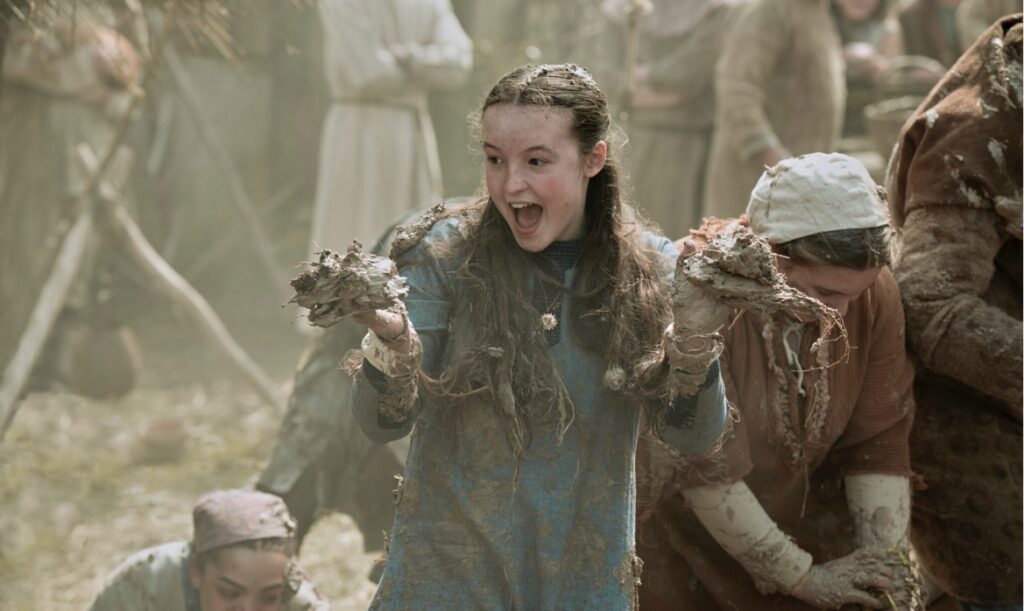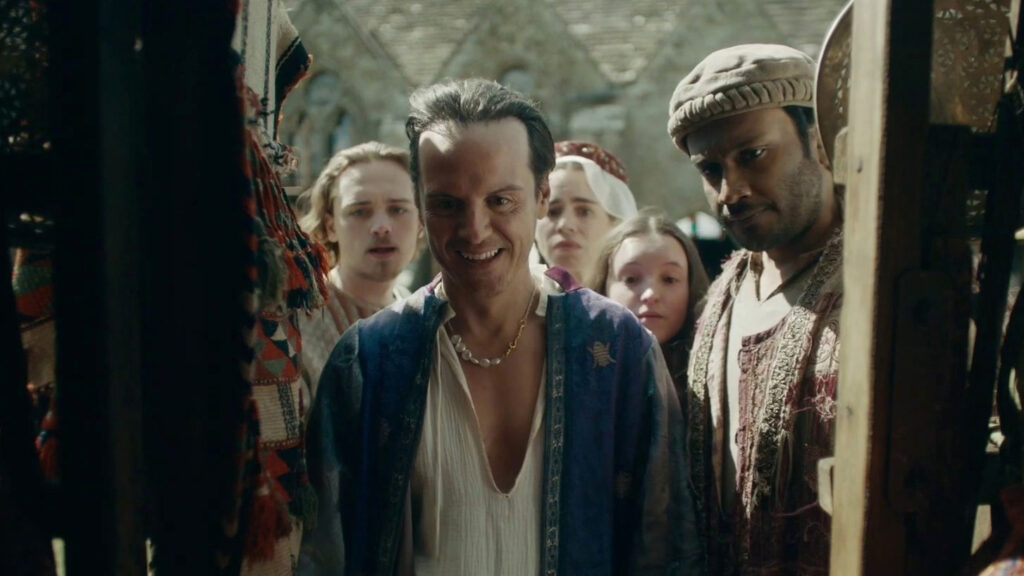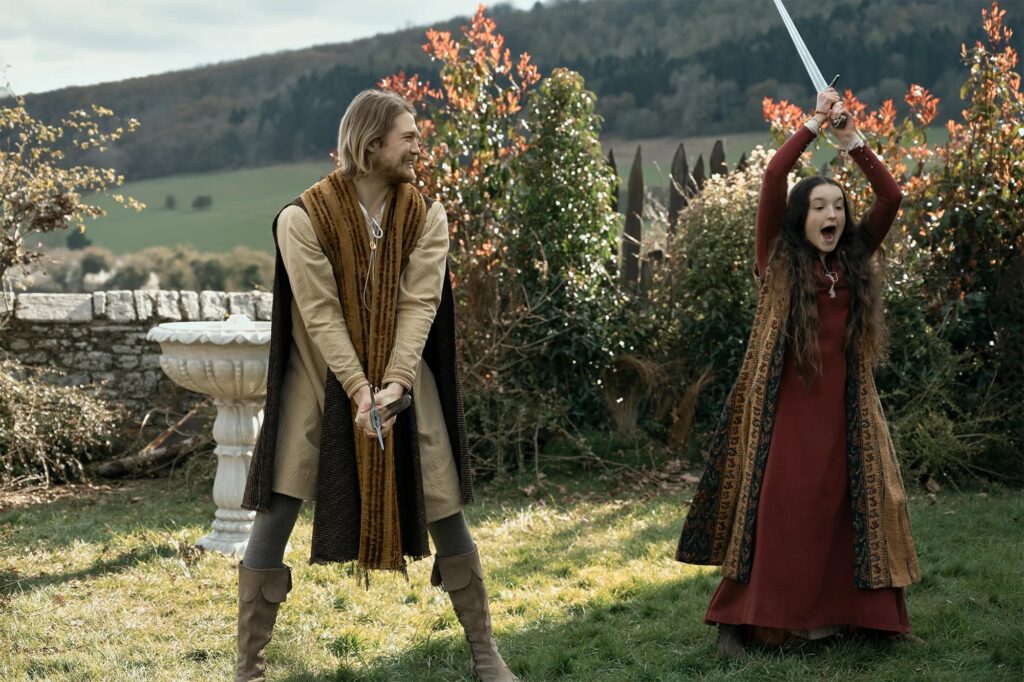If anyone knows the highs and lows of being an outspoken figure at the forefront of female representation in film and TV, it’s Lena Dunham. Thanks to the combination of sporadically brilliant work and a tendency towards controversial comments, she has spent the last ten years or so fluctuating between the two extremes of ‘critical darling’ and ‘social pariah’. With her most recent offering, Catherine Called Birdy, Dunham has managed to re- focus her fiercely progressive creative instincts and sharp eye for dialogue into a naturalistic, often hilarious adaptation of Karen Cushman’s acclaimed 1994 coming-of-age novel.

Bella Ramsey plays Catherine, who (after experiencing her first period and hilariously, solemnly resigning herself to certain death) lands face-first into womanhood and discovers in no uncertain terms that her worth is now based solely on her ability to marry rich and pop out heirs. Thanks to her drunken, extravagant father Lord Rollo (Andrew Scott) squandering the already dwindling finances of the manor (“My tiger has arrived!”), the future prosperity of her clan, and subsequently the entire village of Stonebridge now relies on Birdy’s budding marriageability into a wealthy family. What follows is a fantastically well-acted series of sketches where our plucky heroine blazes through a crash-course in preening, lecherous, would-be suitors, the many faces and nuances of arranged marriage and the push and pull between traditionalism and nonconformity.
In the lead role, Ramsey is mostly excellent: her superb comic timing and laidback, naturalistic performance – only occasionally giving way under the weight of her own exertion – bodes well for her involvement in the upcoming The Last of Us TV series. For the most part, Birdy’s exasperated, open-faced bafflement at her lot in life, and Ramsey’s canny ability to infuse the ornate period dialogue with the brisk, wild-eyed vigour of a young Eddie Murphy is incredibly impressive. The rest of the cast is also – happily – uniformly brilliant.

Billie Piper is wonderful, if a little ornamental, as the tragic but charming Lady Aislinn, and the reliably excellent Paul Kaye is equal parts repulsive and resplendent as the obscenely wealthy and grubby Lord Murgaw (“He owns three small towns! And a leper colony…”). As mentioned before, special mention must go to Scott, who manages to give the seemingly hopeless Lord Rollo a convincing character transformation, from extravagant, affected peacock to honourable, sword fighting nobleman in less time than it takes to say “I’m excellent in basically anything I’m in”. Elsewhere, Sophie Okonedo, Jamie Demetriou and Game of Thrones’ Dean-Charles Chapman fill out their bit-parts as if their lives depended on it. Even Russel Brand, whose real-life views on vaccines would be considered cutting-edge in the Dark Ages, puts in a good effort.
Speaking of real life, Dunham herself has made her fair share of well-intentioned but short-sighted faux pas in her time in the spotlight, so it’s nice to see that reflected here (whether intentional or unintentional). Birdy’s journey is studded with failures, gaffes and opportunities for character growth; as she starts out at def con 5 on the ‘disobedient woman’ scale, these lessons are mostly regarding how to finesse (rather than temper) her rebellious nature to make ‘the system’ work for her, instead of blindly raging within it.

Her relationship with Aelis (Isis Hainsworth) is also a source of dramatic tension (as Aelis develops a relationship with Birdy’s beloved uncle, played by Joe Alwyn) and a chance for Dunham to show off her astonishing talent for crafting affectionate, funny, honest moments of dialogue between women of the kind that are still so rarely seen in mainstream cinema. Overall, the film takes bold steps to reinforce the growing body of female-led, female-focused media out there, but if truth be told, a smidge of that goodwill wears away in a finale that is, essentially, Birdy becoming a bit of a damsel for her father to rescue.
Rapidly following in the wake of Dunham’s previous effort – the uneven Sharp Stick – Catherine Called Birdy is pleasantly surprising: a relentlessly energetic, refreshingly frank, often laugh-out-loud funny coming-of-age story that bundles the seemingly modern ideas of women’s liberation and feminism into a van and dumps them, confused and shivering, into the unforgiving proving ground of 13th Century feudal England. Just don’t call it a period movie.
Catherine Called Birdy is out in cinemas now.
